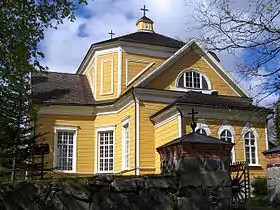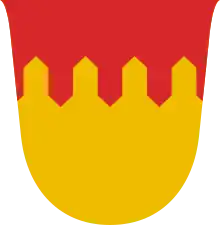Ylöjärvi | |
|---|---|
Town | |
| Ylöjärven kaupunki Ylöjärvi stad | |
 Ylöjärvi library | |
 Coat of arms | |
 Location of Ylöjärvi in Finland | |
| Coordinates: 61°33′N 023°35′E / 61.550°N 23.583°E | |
| Country | |
| Region | Pirkanmaa |
| Sub-region | Tampere sub-region |
| Charter | 1869 |
| Town | 2004 |
| Government | |
| • Town manager | Jarkko Sorvanto resigned on Jan-7 2021 due to litigious situation in town leadership. The position is currently open, town management representatives will interview 5 candidates in the final round (status on Mar-26). |
| Area (2018-01-01)[1] | |
| • Total | 1,324.14 km2 (511.25 sq mi) |
| • Land | 1,115.75 km2 (430.79 sq mi) |
| • Water | 208.62 km2 (80.55 sq mi) |
| • Rank | 69th largest in Finland |
| Population (2023-09-30)[2] | |
| • Total | 33,719 |
| • Rank | 34th largest in Finland |
| • Density | 30.22/km2 (78.3/sq mi) |
| Population by native language | |
| • Finnish | 96.7% (official) |
| • Swedish | 0.4% |
| • Others | 2.9% |
| Population by age | |
| • 0 to 14 | 20.8% |
| • 15 to 64 | 60.7% |
| • 65 or older | 18.5% |
| Time zone | UTC+02:00 (EET) |
| • Summer (DST) | UTC+03:00 (EEST) |
| Unemployment rate | 21% |
| Website | www.ylojarvi.fi |
Ylöjärvi (Finnish: [ˈyløˌjærʋi]) is a town and a municipality in the Pirkanmaa region, 14 kilometres (9 mi) northwest of Tampere and 189 kilometres (117 mi) north of the capital city Helsinki in Finland. The town has a population of 33,719 (30 September 2023)[2] and covers an area of 1,324.14 square kilometres (511.25 sq mi) of which 208.62 km2 (80.55 sq mi) is water. The population density is 30.22 inhabitants per square kilometre (78.3/sq mi).
Ylöjärvi is mostly a rural town. It does not have a clear center; the Tampere–Vaasa highway (E12) and the Tampere–Seinäjoki railway divide the municipality's town center into two major distinct parts: the church village and Soppeenmäki. The railway, completed in 1971, has no passenger seats in the Ylöjärvi area, so buses handle all public transport.[5] The population has increased rapidly in recent years. In 1990 it was slightly over 18,000, while on December 31, 2011, it was 30,942.
The neighbouring municipalities are Hämeenkyrö, Ikaalinen, Kihniö, Nokia, Parkano, Ruovesi, Tampere and Virrat. The municipality of Viljakkala was consolidated with Ylöjärvi on January 1, 2007. The municipality of Kuru was consolidated with Ylöjärvi on January 1, 2009. The coat of arms of Ylöjärvi was designed by Gustaf von Numers and it was confirmed in 1954.[6]
Results of the 2021 Finnish municipal elections, resulted in the True Finns being the largest group on Ylöjärvi council, in Ylöjärvi.[7]
History
The chapel parish of Ylöjärvi was founded in 1779 by separating it from Pirkkala.[8][9] The first church in Ylöjärvi, located on the site of the current church, was completed in 1781, but was destroyed in a fire caused by lightning in 1842.[9] Ylöjärvi was founded as a municipality in 1869. Since January 1, 2004, it has been known as a town (kaupunki). The Finnish Museum of Refrigeration also locates at Ylöjärvi.[10]
Demographics
The following graph shows the population development of the city since 1805. The diagram uses the area division in force at the time.
Culture
Food
In the 1980s, overly sweeted limppu and the "sauna smoked" ham were named Ylöjärvi's traditional parish dishes.[13]
Tree Mountain
The town is the location of Tree Mountain, Land Art by Agnes Denes. This work was conceived in 1983, and construction was announced by the Finnish government at the 1992 Earth Summit. Construction was complete in 1996, and the site is legally protected for the next 400 years.[14] Tree Mountain was dedicated in June 1996 by the President of Finland.[15]
Notable people
- Aron (born 1968), singer, songwriter, and musician
- Marko Asell (born 1970), Greco-Roman wrestler and politician
- Jenni Banerjee (born 1981), actress
- Volmari Iso-Hollo (1907–1969), runner
- Esa Keskinen (born 1965), ice hockey player
- Tauno Kovanen (1917–1986), Greco-Roman wrestler
- Kirsi Kunnas (1924–2021), writer, poet, and translator
- Linda Leppänen (born 1990), ice hockey player and coach
- Rosa Lindstedt (born 1988), ice hockey player and coach
- Jaakko Löytty (born 1955), gospel musician
- Eino Mäkinen (1926–2014), weightlifter
- Matti Niemi (born 1937), rower
- Saara Niemi (born 1986), ice hockey player and coach
- Hannu Oksanen (born 1957), ice hockey player
- Jaakko Syrjä (1926–2022), writer
- Juuse Tamminen (1888–1962), writer
- Jukka Tyrkkö (1912–1979), war writer
- Antti Tyrväinen (1933–2013), biathlete
- Maria Ylipää (born 1981), singer and actress
The rock band Eppu Normaali originates in Ylöjärvi.
International relations
Twin towns — Sister cities
Ylöjärvi is twinned with:
|
|
Gallery
 Ylöjärvi Town Hall
Ylöjärvi Town Hall Ylöjärvi Church
Ylöjärvi Church Ylöjärvi Comprehensive School
Ylöjärvi Comprehensive School Ylöjärvi Firestation
Ylöjärvi Firestation Elovainio Shopping Center
Elovainio Shopping Center
See also
References
- ↑ "Area of Finnish Municipalities 1.1.2018" (PDF). National Land Survey of Finland. Retrieved 30 January 2018.
- 1 2 "Preliminary population statistics 2023, September". StatFin. Statistics Finland. Retrieved 26 October 2023.
- ↑ "Demographic Structure by area as of 31 December 2022". Statistics Finland's PX-Web databases. Statistics Finland. Retrieved 6 September 2023.
- ↑ "Population according to age (1-year) and sex by area and the regional division of each statistical reference year, 2003–2020". StatFin. Statistics Finland. Retrieved 2 May 2021.
- ↑ Jussi Iltanen: Radan varrella: Suomen rautatieliikennepaikat, p. 136. Helsinki: Karttakeskus, 2010. (in Finnish)
- ↑ Mitä-Missä-Milloin 1980, p. 174. (in Finnish)
- ↑ "Finns Party gains, NCP top as turnout dips in Finnish local elections".
- ↑ Tuohitorventien sukututkimuspiste – Seurakuntien pääpiirteittäinen jakautuminen (in Finnish)
- 1 2 YLÖJÄRVI – Svala & Joutsi (in Finnish)
- ↑ "Kylmämuseo". Suomen jäähdytysalan museo. Retrieved 29 March 2020.
- ↑ "Väestö kielen mukaan sekä ulkomaan kansalaisten määrä ja maa-pinta-ala alueittain 1980 – 2016" (in Finnish). Statistics Finland. March 29, 2017. Retrieved October 26, 2021.
- ↑ Kaisu-Maija Nenonen & Ilkka Teerijoki (1998). Historian suursanakirja (in Finnish). WSOY. ISBN 951-0-22044-2.
- ↑ Jaakko Kolmonen: Kotomaamme ruoka-aitta: Suomen, Karjalan ja Petsamon pitäjäruoat, p. 80. Helsinki: Patakolmonen Ky., 1988. (in Finnish)
- ↑ "Tree Mountain". 5 April 2006. Retrieved 2008-10-24.
- ↑ "Finnish Parliament documents". Retrieved 2010-09-06.
External links
![]() Media related to Ylöjärvi at Wikimedia Commons
Media related to Ylöjärvi at Wikimedia Commons
